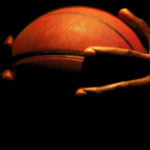Excellence is not a singular act but a habit. You are what you do repeatedly.
Shaquille O’Neal
 The athlete, who understands the power of basketball mental toughness, also comprehends that it is a constant journey of analysis and work to sustain that mental toughness. You can always get stronger physically, and the same is true with the mental preparation for the game of basketball. Developing a solid basketball confidence requires constant examination of thoughts and work to maintain a positive mindset.
The athlete, who understands the power of basketball mental toughness, also comprehends that it is a constant journey of analysis and work to sustain that mental toughness. You can always get stronger physically, and the same is true with the mental preparation for the game of basketball. Developing a solid basketball confidence requires constant examination of thoughts and work to maintain a positive mindset.
If you only feel confident when you’re playing well, then that’s not true mental toughness. Solid basketball confidence maintains focus throughout the slumps, injuries or losses. The player with a strong basketball mind does not allow adversity to change their thoughts nor their mental preparation. Basketball is a mentally challenging game with constant momentum changes and scoring streaks. A player deficient in confidence is completely ruled by these changes and their performance suffers as result.
Sports psychology for basketball promotes exercises that improve and strengthen confidence, but also calls for the examination of thoughts and beliefs that may destroy confidence as well. These unhealthy beliefs limit confidence and weaken a player’s ability to focus.
4 Common Unhealthy Beliefs
• Strict Expectations—the player with strict expectations is constantly working with a sense of inadequacy and failure. Goals and high expectations are crucial to improvement, and should not be viewed as unhealthy. The problems occur when these expectations are not achievable, leaving the athlete never experiencing a sense of accomplishment. Examples of this thinking is the athlete who says, “I can’t ever make a mistake if I want to make the starting five”, or “I can’t ever miss a free throw if I want to get a scholarship.” The mental focus of these athletes resides in worry and fear of failure.
• Negative Self-Labels—labels are constant in the sport of basketball. That player is “clutch”, or that player “chokes” under pressure. The mentally tough athlete understands that labels are merely a descriptor, but should never define a player. There may be a missed shot, but that one play does not define the player’s ability or mindset. If an athlete is labeled something negative by a coach, teammate, parent, or news reporter, it is important to use it as motivation to improve, and then simply move on. Negative labels should never be allowed to reside in your thoughts or your focus.
• Over-generalization—an athlete is prone to over generalization when they take a specific experience and project it to all situations. An example of this thinking is the player who played poorly on a college court, then thinks “I always play bad on college courts.” This is an over generalization because the player hasn’t played on all college courts. Another example is a player who is called for a couple of quick fouls, and they think “These refs have it out for me. They are going to call fouls only on me”. Often because of this negative thinking, the player becomes frustrated and truly does continue to foul out of this anxiety. Their focus is not on the present situation, but rather the previous fouls. It is crippling to think of a negative past experience and somehow expect it to affect you positively in a present situation.
• Unhealthy/Irrational Beliefs—sometimes player develops irrational beliefs about their abilities that are pure mental limitations, not physical. Free throws are perfect examples of mental toughness and focus. A player that struggles may simply give themselves an excuse, “I just never was good at hitting the free throws.” That may be true in the past, but there is defeat in this thinking. It is irrational to think you cannot improve an aspect of your game with enough work and effort. Sometimes players feel a coach particularly doesn’t like them, or is constantly looking for a mistake. Certainly different coaches use different coaching methods, but correction and criticism do not necessarily mean a judgment of the player. The mentally tough athlete must maintain a focus on what he can control in his effort and performance. Energy spent on another person’s reaction, whether it’s a coach, parent or even sports reporter, is wasted because you can only control your thoughts, actions and behaviors, not anyone else’s.
Any basketball player desiring success must first understand the importance of the mental preparation for success. Basketball confidence is critical to achieving success on the court. The game of basketball is 90 percent mental on how to defeat your opponent. There will always be negative distractors, but the mentally tough athlete finds ways to build their confidence and actively seek positive thinking.
Former NBA point guard Steve Nash said this when asked about his confidence, “People have always doubted whether I was good enough to play this game at this level. I thought I was, and I thought I could be. What other people thought was really always irrelevant to me.”
